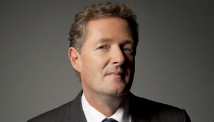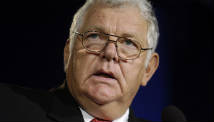The National Rifle Association stood its ground today in arguing that the answer to gun violence in schools is an armed security force that can protect students, while blaming the media and violent entertainment and video games for recent deadly shootings.
"The only thing that can stop a bad guy with a gun is a good guy with a gun," NRA executive vice president Wayne LaPierre said in presenting the NRA's first comments about the Connecticut school shooting since it occured a week ago today.
LaPierre offered no olive branch to gun-control advocates who have called for tougher laws in the wake of the shooting at Sandy Hook Elementary School. Instead, he called for schools across the country to recruit armed security professionals to protect their students.
"It's not just our duty to protect [our children], it's our right to protect them," LaPierre said at a news conference. "The NRA knows there are millions of qualified active and reserved police, active and reserve military, security professionals, rescue personnel, an extraordinary corps of qualified trained citizens to join with local school officials and police in devising a protection plan for every single school."
He was interrupted twice by protestors who stood in front of LaPierre's podium holding signs and shouting that the NRA "has blood on its hands" and that the NRA is "killing our kids." The protestors were eventually escorted out of the room.
President Obama Launches Gun-Violence Task Force Watch Video
President Obama on Gun Control: Ready to Act? Watch Video
Joe Biden to Lead Task Force to Prevent Gun Violence Watch Video
LaPierre also scoffed at the notion that banning so-called assault weapons or enacting gun control laws would stop school violence. He instead cast blame for gun violence in schools on violent entertainment, including video games, and the media.
"How many more copycats are waiting in the wings for their moment of fame from a national media machine that rewards them with a wall of attention they crave while provoking others to make their mark?" he asked.
LaPierre announced that former U.S. congressman Asa Hutchinson of Arkansas would lead the NRA's effort to advocate for school security forces.
The leadership of the NRA has held off on interviews this week after refusing to appear on Sunday morning public affairs shows this past weekend. They said they would grant interviews beginning next week to discuss their position.
NRA News anchor Ginny Simone said Thursday that in the wake of the Sandy Hook shooting, membership surged "with an average of 8,000 new members a day."
New York City Mayor Michael Bloomberg has said the NRA is partially to blame for the tragedy.
"We're not trying to take away your right to advance the interests of gun owners, hunters, people who want to protect themselves," Bloomberg told "Nightline" anchor Cynthia McFadden in an interview Thursday. "But that's not an absolute right to encourage behavior which causes things like Connecticut. In fact, Connecticut is because of some of their actions."
The guns used in the attack were legally purchased and owned by the shooter's mother, Nancy Lanza, whom Adam Lanza shot to death before his assault on the school.
In the aftermath of the shooting, many, including Bloomberg, have called for stricter regulations on the type of weapons used in this and other instances of mass gun violence this year.
Sen. Dianne Feinstein, D-Calif., has said she intends to introduce a bill banning assault weapons on the first day of next year's Congress -- a step the president said he supports.













